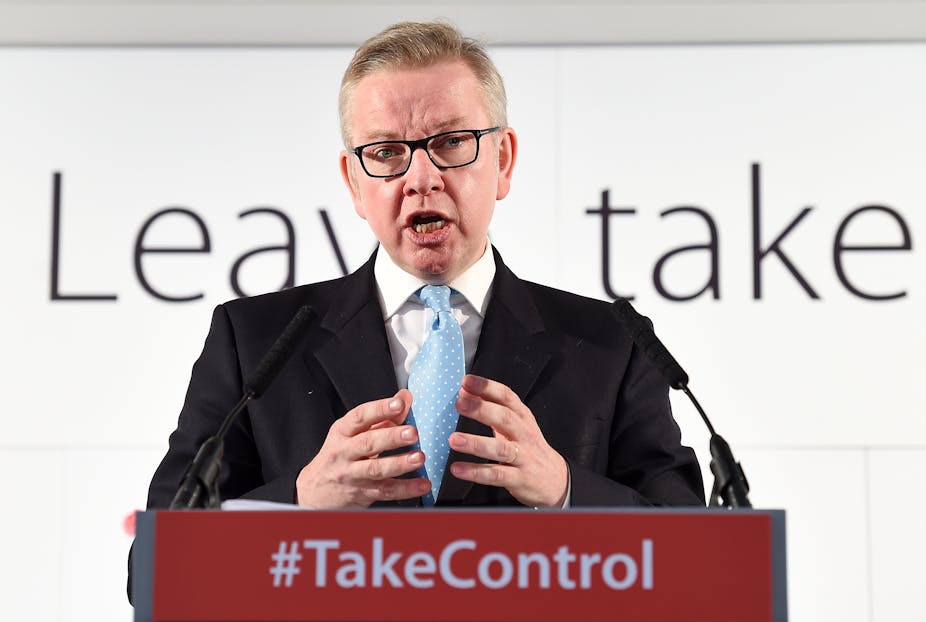Michael Gove has suggested the campaign to remain in the European Union is “operating to a script written by George R.R. Martin”. In his first major speech of the referendum campaign, the justice minister said his rivals were painting a picture of chaos and fear for a post-exit Britain. Yet it’s really senior figures within the Conservative party who appear embroiled in a dangerous Game of Thrones. The struggle could damage the party in future months and years.
Gove implied that Prime Minister David Cameron and Chancellor George Osborne have been treating voters as “mere children, capable of being frightened into obedience”, using scare stories to dissuade then from voting to leave the EU.
In so doing Gove borrowed heavily from the approach taken by the yes campaign during the Scottish Independence referendum in 2014. Just as Alex Salmond sought to project an upbeat message about the prospects of an independent Scotland, so Gove enthused about the “liberation” the UK could experience when freed from the constraints of the EU. And just as the Scottish yes campaign dismissed the warnings of opponents as fear-mongering, so Gove set out to ridicule the “bogeyman” tactics of the remain campaign.
This approach responds to claims that Gove and the leave campaign have lacked a positive vision. Some argue the pro-Brexit camp is stuck on complaints about EU bureaucracy, immigration and costs to the taxpayer.
Gove largely avoided nostalgic references to Britain’s past in his speech, instead arguing that Brexit could be “a galvanising, liberating, empowering moment of patriotic renewal”. Indeed, he not only emphasised how Britain would prosper outside the EU, but how leaving could benefit the rest of Europe by encouraging calls for more democracy across Europe. Perhaps seeking to appeal to left-wing eurosceptics, Gove stressed, for example, that hope could be offered to people in countries like Greece, Spain and Portugal which have been so badly affected by the eurozone crisis.
Strikingly, Gove suggested that following a vote to leave, it would not be necessary to quickly invoke Article 50 of the Lisbon Treaty – the mechanism through which a country leaves the EU. This article contains the requirement for future terms of engagement with the EU to be agreed within two years. Again, Gove’s message issues a direct challenge to Cameron, who has said he would immediately activate Article 50 in the event of Brexit.
Familiar ground
Yet despite the mix of reassuring and inspiring rhetoric, Gove also made heavy use of more familiar anti-EU themes. He dismissed claims that further political integration between EU countries is now off the agenda, stressing the ability of the European Court to extend EU power. He suggested that the UK would be a hostage to decisions made elsewhere if it remained in the EU, suggesting the eurozone countries had the power to outvote the UK in any key decisions.
Gove also argued Britain would benefit from more controls on immigration outside of the EU. Instead of being forced to accept anyone with an EU passport into the UK, he suggested the UK could adopt an Australian-style points based system.
However, all this highlights an ongoing dilemma for Gove and other leading Tory eurosceptics. To what extent is it credible for them to argue for Brexit by effectively attacking the record of their own party in office? If it is true that immigration needs further controls, if productivity is wanting and if Britain is being indeed bullied by its EU partners, can his party, in government for five years, do nothing to improve the situation?
Following a very troublesome few political weeks for both Cameron and Osborne, there is a temptation for the leave campaign to try to channel a protest vote against the prime minister and government. Yet this is a high-risk approach for individuals who know that Conservative politicians will have to work together again once the referendum is over.
Gove’s speech demonstrates again that he is one of the most intelligent leading figures within the Conservative party, but he will realise that every political step over the next two months could have consequences beyond the referendum itself. His profile could rise considerably, and in the event of Brexit he could play a major role in helping decide who inherits the Tory throne from Cameron. But if the UK votes to remain after a brutal referendum battle, Gove himself is not guaranteed a King’s Landing.

